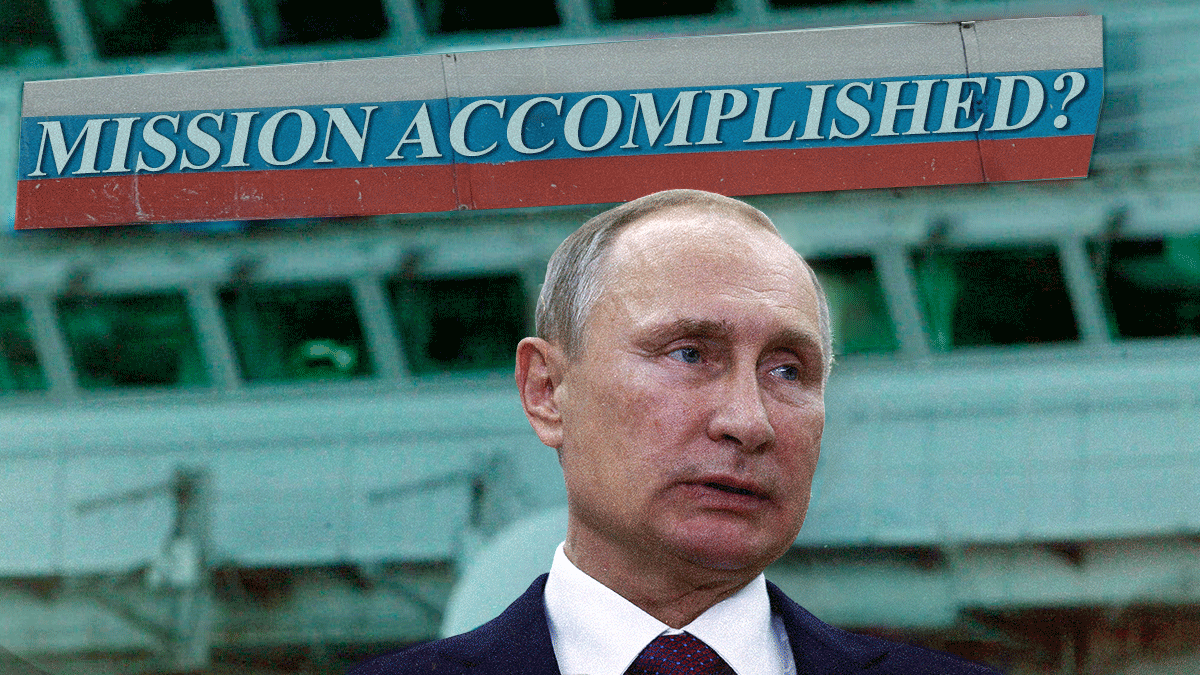Since Russia invaded Ukraine on February 24, speculation has grown about how Vladimir Putin will use the May 9 Victory Day celebration, which commemorates the Soviet triumph over Nazi invaders in 1945. Each year, Russia’s president makes a speech to mark the occasion. For obvious reasons, this year’s address will be analyzed line by line across Russia and around the world.
Will Putin declare “victory” in Ukraine? That won’t be an easy sell. Fierce, skillful Ukrainian resistance and Russia’s surprising military ineptitude forced an early retreat from attempts to capture Kyiv, Ukraine’s capital. Instead, Moscow’s military planners are now focused on extending Russian control over the Donbas region and capturing the territory between Donbas and Russian-controlled Crimea.
If his army can finally subdue the remaining resistance in the strategically vital city of Mariupol, Putin can claim the defeat of the so-called Azov Battalion, Ukrainian fighters with reported links to far-right nationalists. That would fit with Putin’s stated goal of a “de-Nazification” of Ukraine. With Mariupol, he could also claim Russia has seized a port that’s crucial to Ukraine’s economy. There are even signals that Russian soldiers will mark Victory Day in Mariupol itself, if possible, and maybe in other captured parts of Ukraine, as well. Putin may also declare one or more “people’s republics” in captured Ukrainian territory, as Russia has done in the Donbas, or even annex some land, as it did in Crimea.
These are real advances, but in a week when Europe has announced plans to end imports of Russian oil, powerful weapons from NATO countries reached Ukrainian fighters, and anticipation grew that Finland and Sweden will soon join the alliance, doubling the length of the Russia-NATO border, Moscow’s current gains fall well short of “victory.”
Will Putin declare war? Putin still calls his Ukraine invasion a “special military operation” rather than a “war,” in part to reassure Russians that the dangers of blowback in Ukraine and from the West are low. But after 10 weeks of destruction, thousands of lost troops, historically harsh sanctions, and continuing Western support for Ukraine, Putin may need to prepare Russians for a longer and costlier campaign by explicitly declaring war.
Ukrainian officials, Britain’s defense minister, and others have predicted Putin will announce some form of mass mobilization on Monday. Putin has so far promised that Russia will send only professional soldiers, not draftees, into Ukraine. But given the slow progress of Russia’s campaign – and even the risk of defeat – he may decide he needs a lot more troops. A Kremlin spokesman has called this idea “nonsense,” but before the war Putin’s government dismissed American warnings of impending invasion as “Western hysteria.”
The large-scale conscription of Russian young men would sharply raise the stakes for Putin inside Russia as potential draftees and their families come face-to-face with realities of war that don’t appear in Russia’s state-dominated media.
It’s also possible that, to justify a larger mobilization of Russian forces, Putin will issue a kind of declaration of war against NATO. That need not mean World War III, but it could signal an intensified Russian effort to punish Ukraine’s Western backers with economic pressure, cyber harassment, and other forms of more direct confrontation.
More broadly, the speech offers Putin a fresh chance to explain what Russia wants to accomplish in Ukraine, and why. His primary audience remains the Russian public, but foreign governments will scan this speech line by line in hopes of answering three more questions:
- Have the past 10 weeks of war changed Putin’s opinion about what exactly he wants in Ukraine and what he’s willing to do to get it?
- Does any apparent shift in strategy change the risks facing Ukraine and NATO?
- Does a possible redefinition of victory create new opportunities to end the fighting?
Whatever message Putin chooses, May 9 will give us Moscow’s most carefully scrutinized Red Square speech in a very long time.
